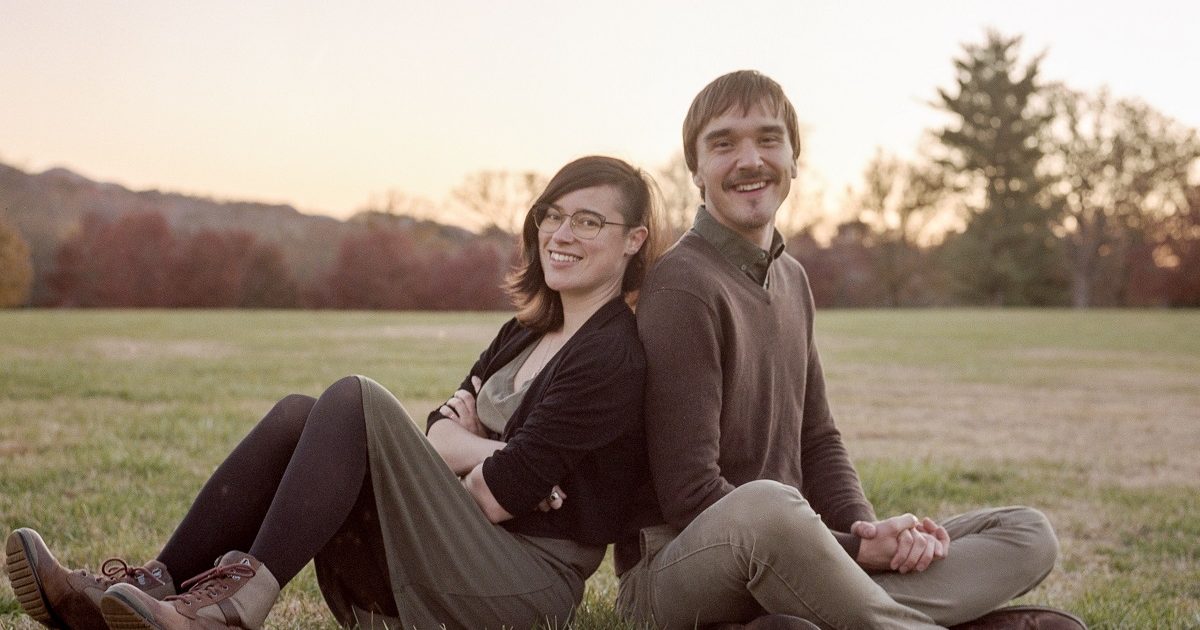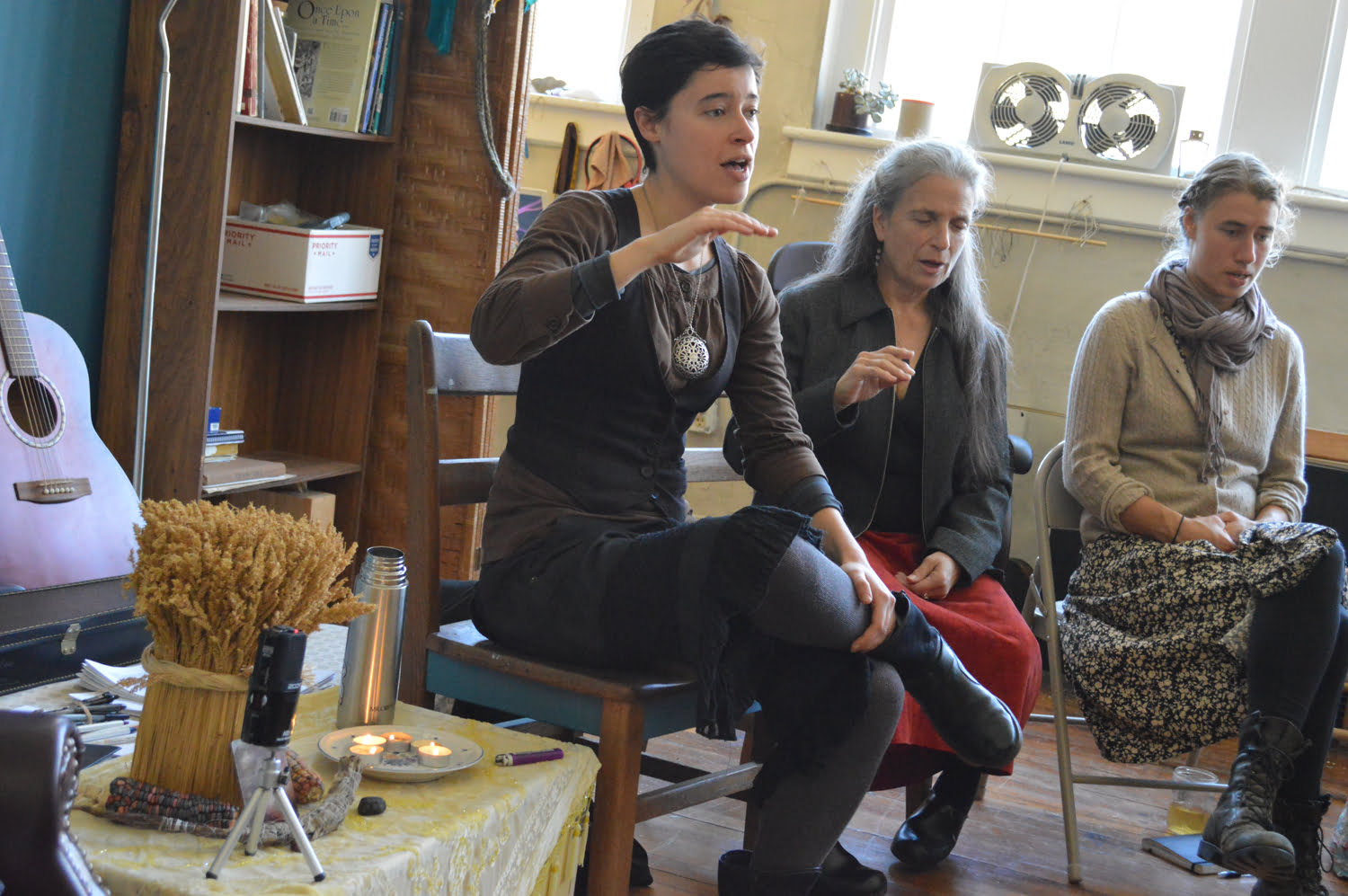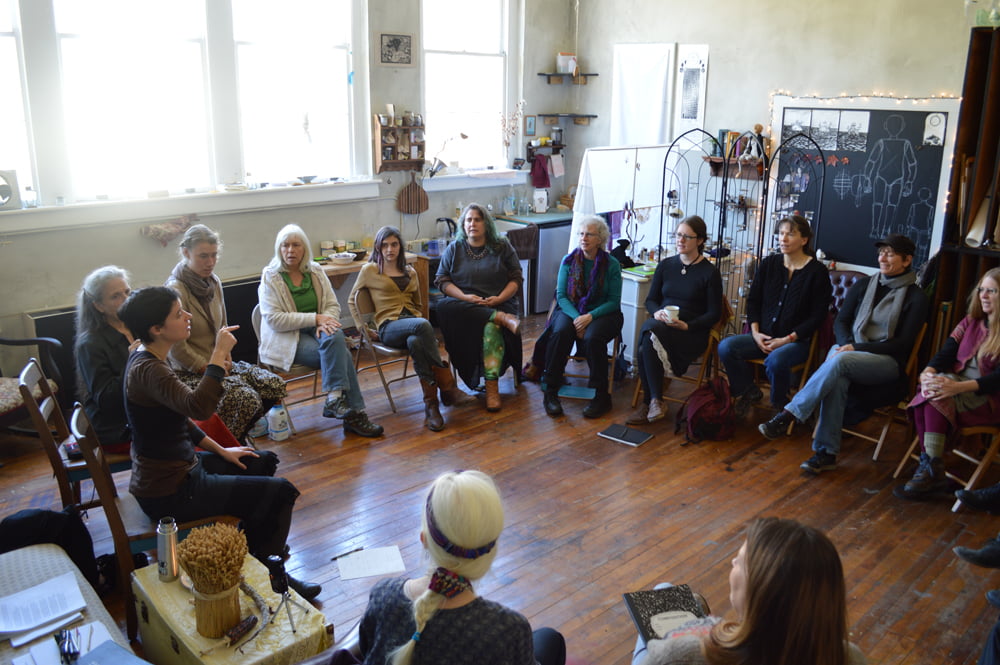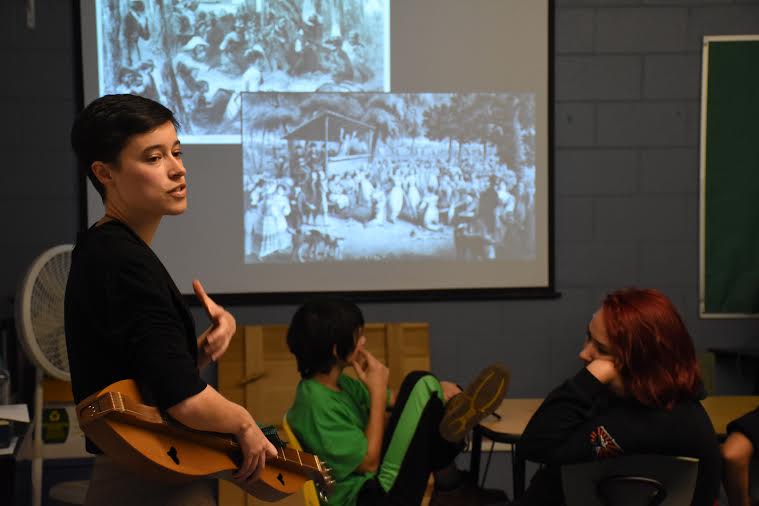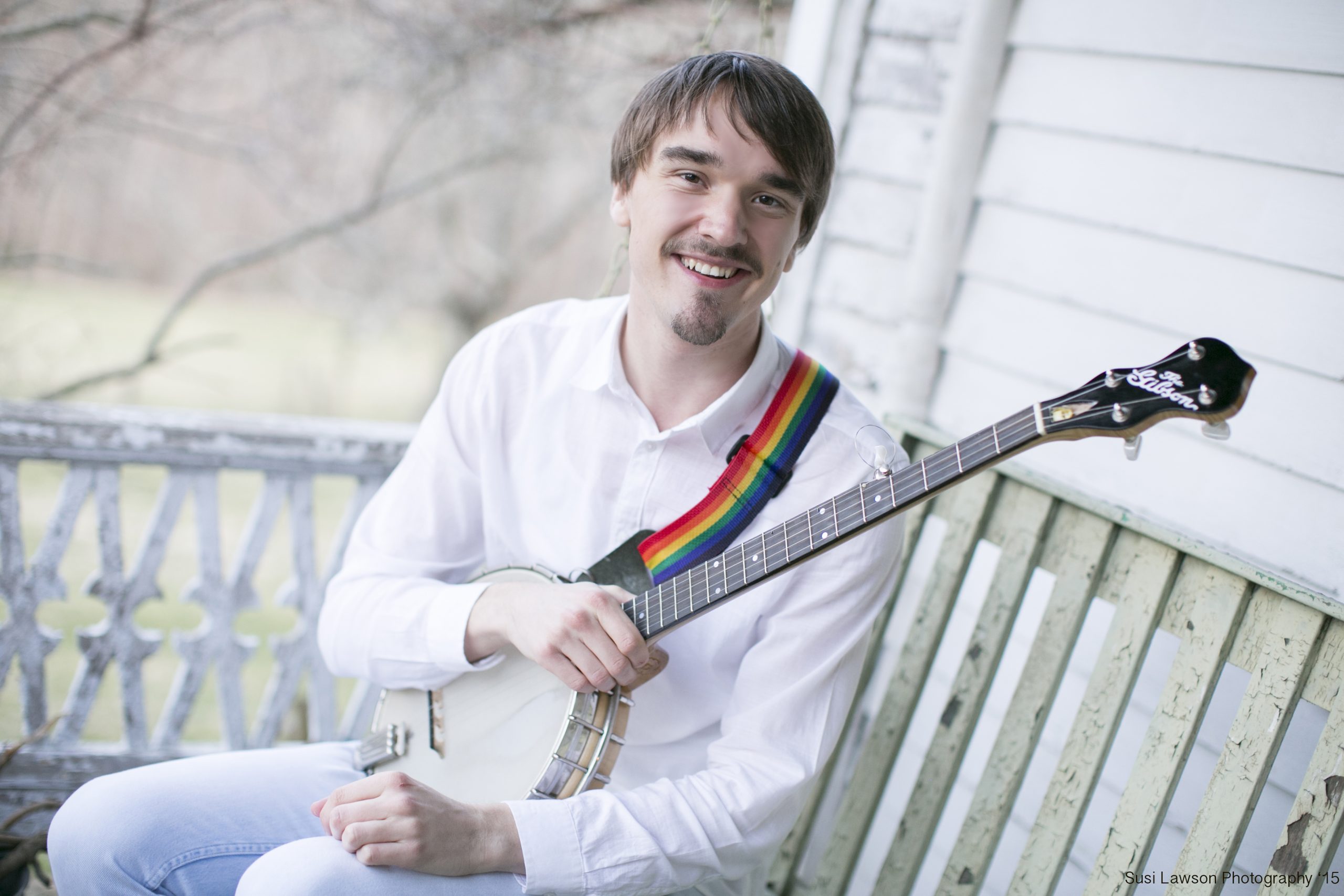On a hot August day in 2011, a long line of demonstrators were crowding the shoulder on the road that winds up Blair Mountain in Logan County, West Virginia. The protesters were speaking out against the threat of mountaintop removal coal mining that endangered the historic site where, 90 years before, 10,000 men and women had taken a violent stand for a working union and human rights in the coalfields. Against the reverberations of history rising up from that mountain ground, Saro Lynch-Thomason stood behind a megaphone and taught the crowd the refrain of “Hold On,” an African-American spiritual and mainstay during the Civil Rights Movement. Adapted for that moment and that struggle, she sang, “We’re gonna march our way to Blair and we’ll meet with our comrades there. Keep your eyes on the prize and hold on.”
Saro Lynch-Thomason sings with purpose. A large part of her singing repertoire and life’s work is Appalachian ballads — the narrative songs which helped an immigrant people remember their homes and histories in a strange land. Noted North Carolina ballad singer Sheila Kay Adams, one of Saro’s mentors, often tells of the older singers calling all the ballads “love songs,” despite storylines riddled with murders, jealousy, and bittersweet, complicated feelings. Whatever they are called, these ballads tell the truth. Set far apart from high-brow popular music, these songs tell the people’s history, brought over time from farmers’ fields and kitchens to concert stages and digital online archives.
In an age when music is most often consumed singularly — and through earbuds — a generation of young singers, including Lynch-Thomason , are committed to learning songs in person and valuing the stories that surround the music. Reviving the old “knee-to-knee” style of sharing stories line by line, Saro collects songs from mentors older than her and her age peers, then adapts the pieces to her own experience. In turn, she teaches workshops that continue to circulate this way of learning. Lynch-Thomason’s work with contemporary media and visual art also serves the mission of rejoining the music with its historical context. She co-produced the multimedia CD and educational resource Blair Pathways; wrote and illustrated Lone Mountain, a children’s book on Appalachian culture and mountaintop removal mining; and has recorded a beautiful solo album of unaccompanied ballads, hymns and group songs titled Vessel.
Saro, could you tell me some about your first experiences with singing and what drew you to unaccompanied singing, in particular?
I was raised in a church that had a strong children’s chorus, so I grew up with a certain amount of unaccompanied singing in a religious atmosphere. I was raised Unitarian Universalist, and we had a very charismatic chorus director who exposed me to a variety of music styles, including shape-note singing. That was a big influence on me as a kid and, at the same time, my father played a lot of British folk revival music in our house and my mother played a lot of music by contemporary female balladeers — like Sinead O’Connor and Loreena McKennitt — and that music really struck me.
So I learned a lot of ballads growing up, just on my own, by myself, not knowing anyone else, as a kid, who liked to do that. Both of my aunts had been active in the folk revival and taught me a few ballads growing up, too.
I’m wondering, when you were young and learning some ballads — and as you continue to learn ballads today — do you think of them visually? I know you’re a visual artist and illustrator, so I was wondering if those two arts are connected for you.
Yes, definitely. I was raised doing a lot of art and had the intention of being an artist as an adult. When I’m singing ballads, I’m always visualizing the story in my head and I use that a lot as a memorization technique, as a way to stay rooted in the story and know what verse is coming next. In some ballads, I see myself as a character, especially when the ballads are in a first-person perspective, and I feel myself taking on and exploring the emotions and the attitude of that character. But, in other cases, I try to take a step back — especially if there are several different characters in a story. I take a step back and try to use my body in a voice that’s setting the scene for the story, and not be a character, specifically, in the story.

Speaking of singing and how it involves the body, I love your record Vessel, which you put out in 2013. I love what you said, that “with each transfer, the song is refitted and molded to the character of the singer.” So I was wondering if you could talk some about that and making that recording.
My CD Vessel is called “Vessel” because these songs, through the fact that they’re transmitted from person-to-person, sort of take on their own character and life. A lot of singers, including myself, feel like we’re vessels — we’re housing these songs until they pass on to the next person. In a way, we’re holding these songs that have their own spirits. So there’s a balance that you have to find between putting yourself in a story and also letting the story tell itself, and letting an audience or letting listeners interpret the song and take the song into themselves and let it be about their own story and their own narrative.
And Vessel, as my first CD, was an attempt to do honor to ballad singers I had learned from — including Sheila Kay Adams and Bobby McMillon and many singers who are long deceased — who told such beautiful stories and expressed themselves so beautifully … like Texas Gladden and singers from archives who we don’t know that much about. My ballad “True Thomas” comes from a woman named Becky Gordon from Catshead, Sugarloaf, North Carolina, and I don’t know much of anything about her, but she had this beautiful song that wasn’t collected anywhere else.
Speaking of your collecting and how you learn from mentors in North Carolina … why do you think it’s important to learn these songs in person, in addition to studying recordings, but also building these relationships with singers?
Something I’ve been thinking about a lot recently is the broader oral tradition around ballad singing, which is what we say about those ballads, what we know and what we share about them, the stories we connect to them. Learning face-to-face with someone, you get to understand so much about them and empathize with them when they tell you how they connect to that ballad and what they have learned from that ballad.
Ballads are intensely personal and intensely public at the same time, and one song can carry so many different stories, depending on who you ask and how they’ve interpreted the song. And so, I think largely learning in what is sometimes called the knee-to-knee style is a practice in empathy and in deep listening to someone else.
I agree, for sure. Can you talk about how ballads, in part, have lead you to North Carolina and how you identify your home there with singing, and also the role of place in this ballad-singing tradition that you’re part of?
I was raised in Middle Tennessee, and a lot of my mother’s family is from East Tennessee and has been in East Tennessee for several hundred years. So I was raised with a big connection to the Blue Ridge Mountains and being in those mountains a lot. I decided to move to North Carolina after college to connect to what I had heard was a vibrant singing community in Western North Carolina, which turned out to be true.
Talking about place in these songs … even though a lot of these songs go back hundreds and hundreds of years, people’s experiences — and, I believe, their physical landscape — changes how they interpret a song and what the song is for. I think there is a way that you can hear the landscape in these songs and, of course, the topic matter of the songs themselves is often about the experiences in the mountains and that connects to experiences that my own family has had and contemporary experiences, too — anything from out-migration from Appalachia to digging ginseng to opposing mountaintop removal. This is a contemporary tradition, and what I’m compelled by is when that sense of place and attachment to this region becomes expressed in these songs in a way that other people can empathize with and understand.
That’s really well said. Tell me about your identity as an activist and how this kind of cultural preservation and singing that you do is tied to your work in social justice movements?
A big connection point for me, coming to Appalachia, was learning, really in college, about social struggles in Appalachia and about mountaintop removal mining. I started to learn in college about the West Virginia coal mine wars and fights for union rights and safety rights for coal miners and that really intrigued me, especially because I was raised in a social justice-oriented household. So I became interested in how people in this region had fought for their rights and how they had used music as a part of that.
Part of what’s intriguing about Appalachia, as a place and how it is viewed by the rest of the country and the world, is that it's a very historicized place — it’s a place that is put in the past. What I love about ballad singing and traditional music from the region is that it can educate so much about Appalachia’s rich and diverse history and it is used as a contemporary tool to express Appalachia’s current situation and its people. Something that I really enjoy doing as an educator and as a ballad singer is doing workshops specifically on Appalachian movement songs, mostly for the reason that it brings people up to date on Appalachia!

Yes, I struggle with some of those same things out on the road and I think it’s important work you are doing. What about your teaching, workshops, and also the Asheville Community Sing that you lead?
I mentioned a little earlier that, as a kid, I was raising myself to be an artist and through whatever I’ve done, it’s always been about stories to me, whatever media I’ve been working in. I like to lead workshops and performances that focus on a theme, like Appalachian movement songs or women’s stories in ballads. My goal is often to give people a sense of history, a sense of our heritage through song, but also to give people confidence about these traditions being a part of their lives and being a way for them to express their stories and to not feel stuck with the stories they’re given, but to feel that they can change them and keep on the oral tradition that way.
The Asheville Community Sing … that’s a monthly event that I’ve been running since 2010. I started the Sing when I moved to Asheville because I wanted to build a traditional singing community around me — kind of a selfish thing! What I wanted to do was build an environment where anyone was welcome, where everyone felt like they could sing as much or as little as they wanted, and share these fantastic traditional songs, most of which were designed for group singing.
So much singing in our contemporary culture is focused on work by singer/songwriters that is not designed to be sung in groups. I wanted to create a space where people felt empowered to sing and, in order to do that, you need to provide songs that are easy for people to sing together. We sing work songs and sea shanties and hymn songs and union anthems and all sorts of songs that people can feel confident doing together.
You talk about how the ballads still have this contemporary relevance, and I know you sing some recently composed ballads. Also, you compose tunes — I know you wrote a beautiful melody to that text of “True Thomas.” So you’re both performing old material and bringing new material into the present?
Different folklorists and singers have different ethics around how much to change a song or not change a song, and I’m basically of the opinion that, if it’s a good story, it should be sung! I think that the most important work that these songs do is to help people connect to their own emotions and their own narratives and to affirm their own experiences. If I connect to a song, but it’s not quite saying what I want to say, I’m all right with changing it … as long as its history is acknowledged in the process.
I found this text of “True Thomas,” which is the only American variant of this particular ballad that I’m aware of, and I just thought it was too precious to not bring back, so I put a melody to it that felt appropriate. There are other times when I have taken a song and politicized it or taken a song and made it much more personal.
A song I like to sing a lot is called “I’m So Glad Today I’m Ready,” which came out of the archives at Berea College when I was studying some there. This song was originally from the perspective of a woman who is going to Heaven and how glad and ready she is to go, and I changed the song to be, instead, about going back to the Blue Ridge Mountains and going back to the New River, which flows through Asheville and has sustained me and given me water. Those are the places I want my body to return to when I pass on. I wanted to keep the spirit of the song, but make it about where I feel rooted and what my story is in Appalachia now.
I think both those stories are important. It’s odd to think about, but perhaps 200 years from now, some folks are going to be referring to singers like you and me as the ancestors who were singing these songs. So we’re constructing these stories and other people can take them or leave them and whatever is relevant will stick.
Ballads are so functional. People sang them in their homes while they worked or were rocking their children or passing the time on long journeys. People really held dear that history and that singing of the ballads. What role do ballads and singing play in your life — what function do they serve for you?
I think, at my core, these songs, what they help me do is emotionally process my experiences. I was teaching a workshop recently on women’s stories in ballads, and something that came up from a lot of people is that there are songs on pretty hard topics for women that many of us enjoy singing by ourselves, but would not share in a group because the content can be disturbing. And, yet, we sing these songs all the time by ourselves because they help us process our experiences. I think that’s a big resource that these songs can provide.
They also help me connect to my fellow humans in that magic way that, when a group of people are sharing vibrations in a room — making vibrations together with their voices — we learn to immediately connect with each other no matter how different we are or how much we might agree or disagree politically, et cetera. When we share our voices, we learn to connect so quickly … and you can think about that from a practical perspective or a spiritual perspective, but that’s another way that these songs help me in my daily life.
Sam Gleaves is a folk singer and songwriter from Southwest Virginia. His latest record, Ain’t We Brothers, is made up of stories in song from contemporary Appalachia, produced by Cathy Fink.
Photo credit: Sarah Morgan
